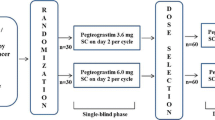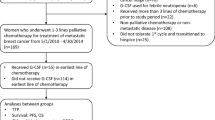Summary
Substantial intensification of chemotherapy doses is a promising approach to the treatment of refractory malignancy currently receiving increasing attention. For the past 4 years we have used 3 repeated cycles of a combination of cyclophosphamide (5 g/m2), etoposide (1500 mg/m2), and cisplatin (150 mg/m2) without replacement of progenitor cells and with and without colony-stimulating factor support. The duration of threatening levels of granulocytopenia with this regimen averages 10.2 days, although an occasional patient has prolonged recovery (range, 5–20 days) and most patients require antibiotic therapy for cytopenic fever. We have not yet identified the optimal dose of GM-CSF, but 500 µg/m2 significantly shortens the duration of cytopenia (ANC < 300/mm3) to 5.9 days with a resultant decrease in incidence and duration of cytopenic fever (from 10.8 to 1.7 days), use of antibiotics (from 10.8 to 7.6 days), and duration of hospitalization (from 22.2 to 16.3 days). Seventeen patients with metastatic breast cancer have received this regimen to date with a 35% complete response (CR) rate and a 53% partial response (PR) rate. Most of these patients were refractory to standard therapy. Four of six (67%) not refractory to standard therapy have achieved complete responses that are ongoing at 3.5 to 10.4 months. We conclude that dose-intensive therapy is an option that needs more careful exploration early in the treatment of advanced breast cancer and that GM-CSF decreases morbidity and risk of dose-intensive regimens.
Similar content being viewed by others
References
Hryniuk WM: Average relative dose intensity and the impact on design of clinical trials. Semin Oncol 14: 65–74, 1987
Hryniuk WM: More is better. J Clin Oncol 6: 1365–1367, 1988 (Editorial)
Frei E III, Antman K, Teicher B, Eder P, Schnipper L: Bone marrow autotransplantation for solid tumors — prospects. J Clin Oncol 7: 515–526, 1989
Antman K, Gale RP: Advanced breast cancer: high-dose chemotherapy and bone marrow autotransplants. Ann Intern Med 108: 570–574, 1988
Carbone PP: High-dose chemotherapy for breast cancer. J Clin Oncol 5: 167–168, 1987 (Editorial)
Skipper HE: Why do experimental neoplasms with different growth rates respond differently to similar doses of a given drug? Booklet 19. Southern Research Institute, Birmingham, Ala, 1988
Schabel FJ, Griswold DP, Corbett TH, Laster WR: Increasing the therapeutic response rates to anticancer drugs by applying the basic principles of pharmacology. Cancer 54: 1160–1167, 1984
Henderson IC, Hayes DF, Gelman R: Dose-response in the treatment of breast cancer: a critical review. J Clin Oncol 6: 1501–1515, 1988
Williams SF, Mick R, Dresser R, Golnick J, Beschorner J, Bitran JD: High-dose consolidation therapy with autologous stem cell rescue, in stage IV breast cancer. J Clin Oncol 7: 1824–1830, 1989
Gianni AM, Bregni M, Siena S, Orazi A, Stern AC, Gandola L, Bondonna G: Recombinant human granulocyte-macrophage colony-stimulating factor reduces hematologic toxicity and widens clinical applicability of high-dose cyclophosphamide treatment in breast cancer and non-Hodgkin's lymphoma. J Clin Oncol 8: 768–778, 1990
Ellis GK, Green S, Schulman S, Tranum BL, Goldberg RS, Livingston RB: Combination chemotherapy and high-dose cyclophosphamide intensification for poor prognosis breast cancer. Cancer 64: 2409–2415, 1989
Peters WP, Shpall EJ, Jones RB, Olsen GA, Bast RC, Gockerman JP, Moore JO: High-dose combination alkylating agents with bone marrow support as initial treatment for metastatic breast cancer. J Clin Oncol 6: 1368–1376, 1988
Dunphy FR, Spitzer G, Buzdar AU, Hortobagyi GN, Horwitz LJ, Yau JC, Spinolo JA, Jagganath S, Holmes F, Wallerstein RO, Bohannan PA, Dicke KA: Treatment of estrogen receptor-negative or hormonally refractory breast cancer with double high-dose chemotherapy intensification and bone marrow support. J Clin Oncol 8: 1207–1216, 1990
Israel L, Breau J-L, Aguilera J: High-dose cyclophosphamide and high-dose 5-fluorouracil: a new first-line regimen for advanced breast cancer. Cancer 54: 1655–1659, 1984
Cooper RH: Combination chemotherapy in hormone-resistant cancer. Am Soc Clin Oncol 10: 1367, 1969 (Abstract)
Osborne CK: Dose intensity as a therapeutic strategy in breast cancer. Breast Cancer Res Treat 20: S11-S14, 1991
Hoogstraaten B, George S, Samal B: Combination chemotherapy and adriamycin in patients with advanced breast cancer. Cancer 38: 13–20, 1976
Smalley RV, Murphy S, Huguley CM: Combination vs sequential five-drug chemotherapy in metastatic adenocarcinoma of the breast. Cancer Res 36: 3911–3916, 1976
Tannock IF, Boyd NF, DeBoer G, Erlichman C, Fine S, Larogue G, Mayers C, Perrault D, Sutherland H: A randomized trial of two levels of cyclophosphamide, methotrexate, and fluorouracil chemotherapy for patients with metastatic breast cancer. J Clin Oncol 6: 1377–1387, 1988
Carmo-Pereira J, Costa FO, Henriques E, et al: A comparison of two doses of adriamycin in the primary chemotherapy of disseminated breast carcinoma. Br J Cancer 56: 471–473, 1987
Malik R, Blumenschein GR, Legha SS, Hortobagyi GN, Buzdar A, Yap HY, Hill S, Bodey GP: A randomized trial of high dose 5-fluorouracil (F), doxorubicin (A) and cyclophosphamide (C) vs conventional FAC regime in metastatic breast cancer. Proc Am Soc Clin Oncol: 79, 1982 (Abstract)
Hortobagyi GN, Buzdar AU, Bodey GP, Kau S, Rodriquez V, Legha SS, Yap HY, Blumenschein GR: High-dose induction chemotherapy of metastatic breast cancer in protected environment: a prospective randomized study. J Clin Oncol 5: 354–364, 1987
Legha SS, Buzdar A, Smith TL: Complete remissions in metastatic breast cancer treated with combination drug therapy. Ann Intern Med 91: 847–852, 1979
Neidhart JA, Kohler W, Stidley C, Mangalik A, Plauche A, Anderson T, Quenzer RW, Rinehart JJ: Phase I study of repeated cycles of high-dose cyclophosphamide, etoposide, and cisplatin administered without bone marrow transplantation. J Clin Oncol 8: 1728–1738, 1990
Neidhart J, Mangalik A, Kohler W, Stidley C, Saiki J, Duncan P, Souza L, Downing M: Granulocyte colonystimulating factor stimulates recovery of granulocytes in patients receiving dose-intensive chemotherapy without bone marrow transplantation. J Clin Oncol 7: 1685–1692, 1989
Neidhart J, Stidley C, Ferguson J, Mangalik A, Anderson T, Oldham F: GM-CSF decreases duration of cytopenia in patients receiving dose intensive therapy with cyclophosphamide, etoposide, and cisplatin. Proc Annu Meet Soc Clin Oncol 9: 753, 1990
Kolaric K, Roth A: Phase II clinical trial of cis-dichlorodiammine platinum (cis-DDP) for antitumorigenic activity in previously untreated patients with metastatic breast cancer. Cancer Chemother Pharmacol 11: 108–112, 1983
Cox EB, Burton GV, Olsen GA, Vugrin D: Cisplatin and etoposide: an effective treatment for refractory breast carcinoma. Am J Clin Oncol 12: 53–56, 1989
Estape J, Daniels M, Viñolas N, Santabarbara P, Grau JJ, Gardella S: Combination chemotherapy with oral etoposide plus intravenous cyclophosphamide in liver metastases of breast cancer. Am J Clin Oncol 13: 98–100, 1990
Author information
Authors and Affiliations
Rights and permissions
About this article
Cite this article
Neidhart, J.A. Dose-intensive treatment of breast cancer supported by granulocyte-macrophage colony-stimulating factor (GM-CSF). Breast Cancer Res Tr 20 (Suppl 1), S15–S23 (1991). https://doi.org/10.1007/BF01908240
Issue Date:
DOI: https://doi.org/10.1007/BF01908240




